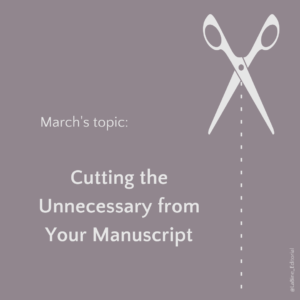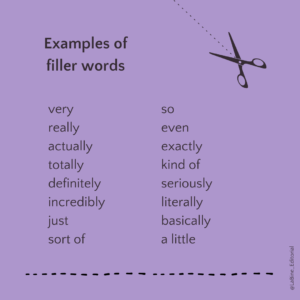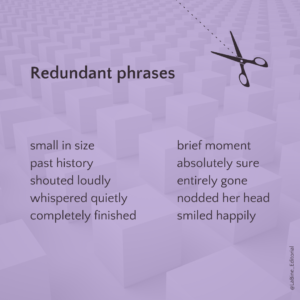You’ve completed the story-level revisions to your manuscript. You’re happy with the structure, character arc of the main character, plot, subplot or parallel plots, and pacing.
 Congratulations! You’re ready for the later stages of editing, which involve revisions at the paragraph and sentence levels of your story.
Congratulations! You’re ready for the later stages of editing, which involve revisions at the paragraph and sentence levels of your story.
Does the thought of more editing make you feel overwhelmed?
Here’s an easy place to start: find all the unnecessary sentences, phrases, and words in your manuscript and get rid of them. Go ahead—be a little ruthless.
Once you’ve trimmed the extra from your manuscript, you’ll be left with what’s essential to your story, which you can then take the time to polish until it shines.
I suggest using this strategy as you self-edit each draft of your manuscript: focus on cutting before polishing (if you choose to polish in the earlier stages). Then, on to the next draft or on to your editor (who will most likely begin the same process).
How will your manuscript benefit?
You’re more likely to keep readers engaged. Fiction writing with a lot of extraneous words and sentences is tedious to read. When the excess is cut out, your prose is more powerful because each word in your manuscript has a purpose. Your story becomes more entertaining to read.
Your book might be more marketable. Books that are longer than usual for their genre often have too much in them. They can lack focus. Those word-count guidelines have come about for a reason! Don’t ignore them. Keeping your manuscript’s word count within the desired range for your genre will most likely make your book more marketable.
Most of the writers who come to me for editing benefit from decreasing their word count. Again, this means cutting out the unnecessary.
What to cut?
Below are some categories of words and phrases that you might consider cutting from your manuscript when you start self-editing at the sentence level.
I look for the following when editing my clients’ manuscripts:
 Filler words. Filler words are words in your writing that don’t add any value. Removing these words tightens your sentence without changing its meaning.
Filler words. Filler words are words in your writing that don’t add any value. Removing these words tightens your sentence without changing its meaning.
These words aren’t filler every time they’re used, but they often are.
Take a look at the sentences, with and without filter words, below.
He very expertly backs his truck into the really small parking space.
What if they never even completely finished the project?
She just couldn’t believe he was actually ignoring her again.
I almost wanted to tell him to just leave me there at the train station.
Revised: He expertly backs his truck into the tiny parking space.
Revised: What if they never finished the project?
Revised: She couldn’t believe he was ignoring her again.
Revised: I wanted to tell him to leave me there at the train station.
Unnecessary prepositions. Sometimes those prepositions can be cut. I would suggest trimming the following sentences as shown:
I’d like to meet up with you at the library.
The host opened up the door for his guests.
Jill stood up to help him carry the boxes of costumes over to the car.
Inside of the house, the smell of fresh strawberries and whipped cream filled the air.
Revised: I’d like to meet you at the library.
Revised: The host opened the door for his guests.
Revised: Jill stood to help him carry the boxes of costumes to the car.
Revised: Inside the house, the smell of fresh strawberries and whipped cream filled the air.
Hint: When the precedes inside, use of.
Would you like to see the inside of the house?
but
Would you like to see inside the house?
Filter words and phrases. Filter words and phrases put space between your readers and whatever your point-of-view character is experiencing. If you are writing in the first-person point of view or in the close third-person point of view, filter words can be detrimental to your story.
One of the benefits of writing in first person and close third person is that readers can more easily become immersed in your story. Using filter words would counteract this benefit, reminding readers that they are, in fact, reading a book.
Here’s an example of filters used in a first-person, present tense manuscript:
It seems that I have interrupted the party. I see everyone staring at me, and I feel my cheeks go red. I know I have to get out of here.
How does this read without filters?
I have interrupted the party. Everyone stares at me, and my cheeks go red. I have to get out of here.
Here’s an example of filter words used in a third-person, past tense manuscript:
Cary knew the woman was fooling with him. He had seen her tuck the folded bills into her shirt as he walked to the table. Her half smile made him feel annoyed.
And now without the filters:
The woman was fooling with him. She had tucked the folded bills into her shirt as he walked to the table. Her half smile annoyed him.
Don’t you feel closer to the point-of-view character when the filters are cut? Isn’t it easier to imagine yourself in their situation?
Adverbs. Try to avoid using too many adverbs; instead, use stronger verbs. A classic example is the dialogue tag she said quietly, which is more effective when written as she whispered.
Here’s another example:
Charlie walked casually to the counter.
Revised: Charlie sauntered to the counter.
Repetition. Every writer who self-edits will find repetition. Trust me! I often find repetition in my own blog posts—after reading them for the fourth time.
- Pet words and phrases. We all have words and phrases we tend to overuse. Be aware of your own. (I use definitely and that said way too often. Yours may be eyes wide or of course or meanwhile. We all have several.) The more unusual the word or phrase, the more it will be noticed every time it’s used.
- Character and setting descriptions. Make sure you don’t mention his icy-blue eyes or the nightclub’s insufferable heat 20 times in your manuscript. If it’s important to mention a characteristic more than once, try to do so using different words each time.
- Action beats. Find your frequently used action beats. Is she smiled on every page of your manuscript? You’ll want to delete or replace those. What about he shifted in his seat? A slightly unusual or specific action beat shouldn’t be used more than a few times in your whole manuscript.
- Unique dialogue tags. As I’ve said in a previous post, feel free to repeat tags like said and asked as much as you want. But keep tags like snarled, screeched, and droned to a minimum. Do not repeat these more than once or twice—it’s noticeable when you do.
- Sentence structure. Fixing a repetitive sentence-structure issue requires more revising than cutting, but I didn’t want to talk about repetition without mentioning it. Vary the way your sentences are written. When all the sentences in a paragraph are written similarly, it can sound amateurish. Here’s an example:
As she raced to catch the bus, she tripped on the boy’s outstretched leg. As she fell, she saw the boys pointing at her and laughing. She lay sprawled on the sidewalk, the contents of her backpack spilled about her. As she thought about revenge, her cheeks turned red.
- Words that are repeated in close proximity. Sometimes when a word (or part of a word) is used more than once in a sentence, or in several sentences in a row, the writing sounds awkward.
I didn’t want to go outside and make small talk with my dad’s side of the family.
The blue of the water caught my eye. I set down my glass of water and walked over to the railing.
He pulled her into his arms and let out a happy sigh. Lin trembled in his arms. He looked down at her. “Are you okay?”
Revised: I didn’t want to go outside and make small talk with my dad’s family.
Revised: The blue of the water caught my eye. I set down my glass and walked over to the railing.
Revised: He pulled her into his arms and let out a happy sigh. Lin trembled. He looked down at her. “Are you okay?”

- Redundant phrases. Redundant phrases include two or more words that say the same thing or repeat the obvious. (For example, if something is described as small, readers already know you’re talking about size.)
How to spot the unnecessary
The easiest way to find unnecessary repetition in your writing is to read your manuscript out loud to yourself. Don’t focus on the storyline during this reading; focus on the way the paragraphs and sentences sound when read out loud. Most likely, the repetitive words will stick out and sound grating.
Use Find in MS Word to search for filler and filter words and phrases. Delete what can be cut, or replace if necessary (usually deleting is all that’s needed).
Does it all have to go?
No! Everyone has their own writing style. Some writers will have a leaner style than others.
Sometimes a sentence does benefit from a filler word, a filter phrase, or a repeated word. If you love the way a certain sentence or section is written, leave it and ask your beta readers or editor(s) what they think.
Even then, remember that this is your manuscript, and you have the final say. Writing (and editing too) is an art. There are no official rules. And reading would be boring if everyone’s writing were the same. Just be sure to be judicious about breaking with convention so that when you do, it’s impactful instead of annoying or amateurish.
Be aware, though, that most of the time there is plenty of deleting to do in an unedited manuscript. If you can’t find anything to cut, you aren’t looking closely enough.
Some exceptions
Without any filler words, dialogue can sound unnatural. We use filler words when we talk. While you don’t want to use as many ums, ahs, and likes as the average person in a real-life conversation (this would get difficult to read), adding a bit of filler can improve dialogue.
No filler:
“David, I wish you were going with me.” Jake’s eyes pierced into mine. “I’m going to miss you.”
Some filler:
“Yeah, that’s the thing, David. I wish you were going with me.” Jake’s eyes pierced into mine. “I’m really going to miss you.”
Perhaps, too much filler?
“Yeah, well . . . That’s the thing, David. I, um . . . I wish you were going with me.” Jake’s eyes pierced into mine. “I’m, like, really going to miss you. Really.”
Filter words can work well for a more distant point of view. It’s rare to hear that filter words can be helpful in writing because first-person point of view and close third-person point of view are big favorites these days.
However, if you are writing your story with more narrative distance*, using filter words will help you.
Whew! That’s a lot to find and change/delete. But I guarantee you’ll be happy with the outcome.
*I would like to blog about narrative distance in the future, but until then, if you’re wondering what narrative distance is, check out Janice Hardy’s blog post “Keeping Your Distance: How Narrative Distance Works in Your Novel.”
